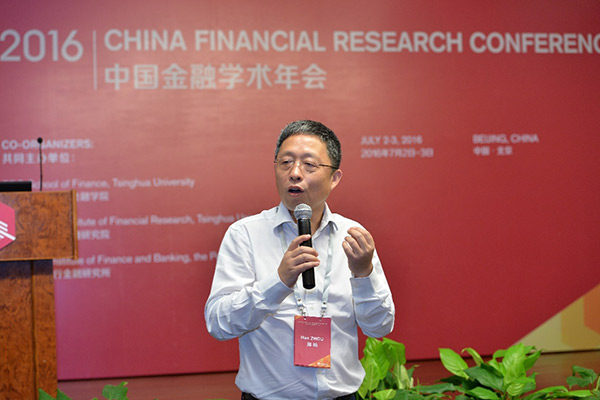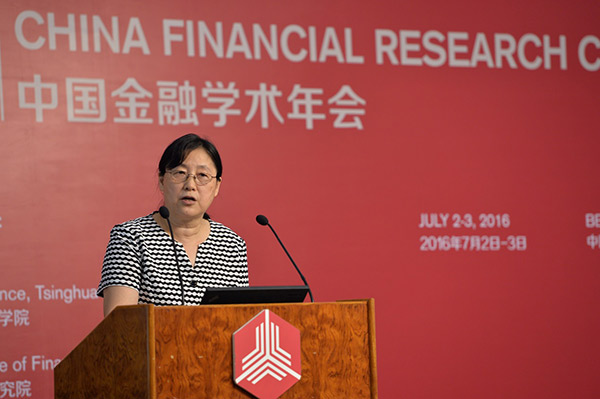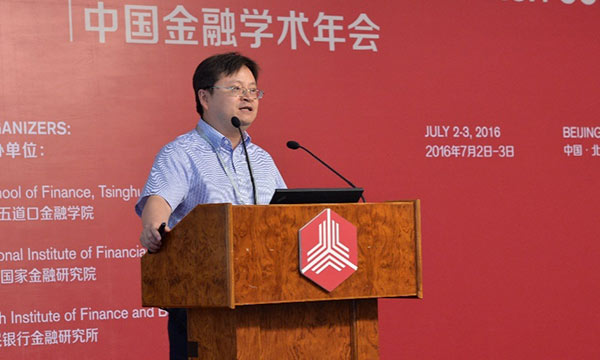Conference in Beijing tackles thorny financial problems
Updated: 2016-07-15 10:30
By Song Jingli(chinadaily.com.cn)
|
|||||||||
 |
|
Zhou Hao, associate dean of the PBC School of Finance, Tsinghua University, hosted the 2016 China Financial Research Conference in Beijing on July 2. [Photo provided to chinadaily.com.cn] |
Changes in China's finance sector, including last year's stock market rout and sky-rocketing housing prices, have not only gained attention in the real world, but also thorough academic studies.
A total of 46 papers covering frontier issues such as shadow banking, foreign exchange rate reform and local government debts, out of 135 papers in English and 150 in Chinese submitted, were presented and discussed in Beijing during the 2016 China Financial Research Conference held between July 2 and July 3.
The conference was jointly organized by the PBC School of Finance, Tsinghua University, the National Institute of Financial Research, Tsinghua University and the Research Institute of Finance and Banking at the People's Bank of China, the central bank. Such a conference, serving as a communication platform between policymakers and scholars, will be held once each year starting from this year, according to the organizers.
Two scholarly papers in English and two in Chinese earned this year's best-paper honors.
The English paper Leverage Network and Contagion, collaborated between Bian Jiangze, Da Zhi, Lou Dong and Zhou Hao, examines the risk contagion of the Chinese stock market crisis in 2015 by taking advantage of unique account-level data.
The other English paper, Liquidity regulation and unintended financial transformation in China, co-authored by Kinda Hachem from the University of Chicago Booth School of Business, along with Song Zheng, attempts to explain why the interbank market became tighter and more volatile and establishes a theoretical framework: shadow banking made China's small and medium-sized banks evade the regulation of cap rates and achieve earnings while large banks used their power in substantial interbank market to restrict credit to the shadow banks and increase their lending to non-financials.
The Chinese paper, Capital flow management and the prevention of financial crisis in China, jointly written by Ju Jiandong, Wei Shangjin, Lin Shu, Li Li and Nie Guangyu, emphasizes potential risks brought by opening capital accounts and policy instruments of capital flow management.
The other Chinese paper, The impact of CEO early-life experience on corporate polices: Evidence from the three years of Great Chinese Famine, co-authored by Peng Xiaopeng and Li Minwen, finds that early-life experiences of the three-year Great Chinese Famine has had a significant influence on companies' financial decision making, mainly manifested in lower long-term and short-term liability rates and less research and development investment.
 |
|
Zhang Xiaohui, assistant governor of the People's Bank of China, made a keynote speech at the 2016 China Financial Research Conference in Beijing on July 2. [Photo provided to chinadaily.com.cn] |
In addition, in the sub-conference on Chinese credit markets, Gao Haoyu from the City University of Hong Kong and also co-author of the paper Contract Enforcement and Strategic Default: Evidence from China, shared an analysis on the repayment decisions of borrowing firms whose cash holdings are high enough to cover the matured bank debt. Findings revealed that poor judicial enforcement significantly increases the likelihood of default.
In the sub-conference on real estate in China, Han Bing, from the Rotman School of Management, University of Toronto, and also co-author of Housing price and fundamentals in a transition economy: The case of Beijing market, shared their findings on the links between house values and fundamental economic variables such as income growth, demographics, migration and land supply.
Zhang Xiaohui, assistant governor of the central bank, said she was happy to see so many people were interested in China's financial problems and were willing to do academic studies in those areas.
She also made a keynote speech, titled On monetary policy: What we have achieved and what we should do next, to all the participants.
Zhang further expressed her hope that financial researchers could prioritize the concrete problems China was facing in the era of economic globalization provide suggestions to Chinese policymakers to aid the country's economic and financial development.
 |
|
Guan Tao, an Academic Committee senior fellow at the China Finance 40 Forum, made a keynote speech during the 2016 China Financial Research Conference in Beijing on July 2. [Photo provided to chinadaily.com.cn] |
In addition to the assistant governor, Guan Tao, an Academic Committee senior fellow at the China Finance 40 Forum, also made a keynote speech titled Two impossible trinities and policy options addressing capital reversal.
He pointed out that economic stability and financial stability was key for maintaining a stable currency.
There should be no judgment on which is good and which is bad between the three foreign exchange policy tools, namely, exchange rate,foreign exchange intervention and capital controls, Guan told the audience.
Related Stories
Sun Yefang Foundation wants more global study of China's financial sector 2016-07-05 14:24
Tsinghua Holdings president: innovative entrepreneurial service enters the age of 3.0 2016-06-30 16:11
2016 Tsinghua Aging Industry Forum opens in Beijing 2016-06-16 10:04
Tsinghua announces think tank focused on public-private partnership 2016-04-24 11:16
Today's Top News
May stuns political world by appointing Boris Johnson
Li calls Sino-Mongolia ties 'best ever'
Russian, Chinese officials discuss space cooperation
25 killed, 50 injured as trains collide in Italy
EU called on to fulfill WTO promises
Ruling inherently biased and unjust 'piece of paper'
Tribunal issues ill-founded award on South China Sea
Theresa May set to be UK's next PM after rival quits
Hot Topics
Lunar probe , China growth forecasts, Emission rules get tougher, China seen through 'colored lens', International board,
Editor's Picks

|

|

|

|

|

|







